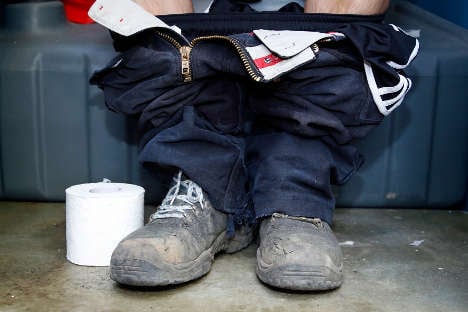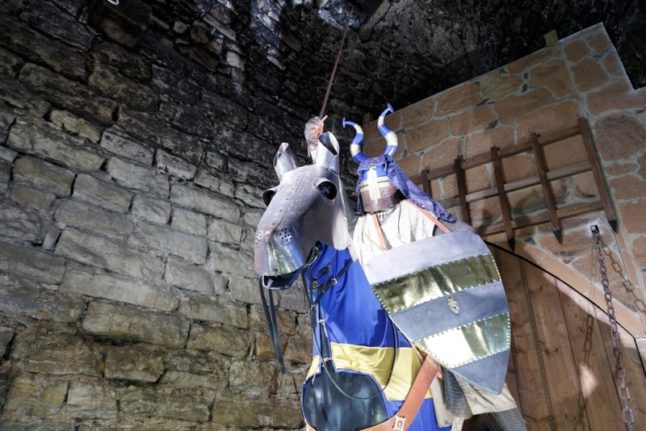Not crossing the street until it’s green
 Berlin's famous Ampelmann. Photo: DPA
Berlin's famous Ampelmann. Photo: DPA
In the Anglophone world it might seem like perfectly reasonable behaviour to step out into the road if you’ve scoured both horizons and not found a vehicle in sight.
But in Germany it’s considered downright reckless – and a bad example to children, who might be watching out of windows even if they're not there beside you on the street.
Give yourself a few months and you’ll be waiting with the crowds for the little man to turn green – if you don’t, prepare to get shouted at.
Saying hello and goodbye to shop owners
 A small late-night convenience store. Photo: DPA
A small late-night convenience store. Photo: DPA
It would seem downright rude to ignore a shopkeeper or cashier in Germany, even if you don’t end up buying anything.
Germans may not be known for their friendliness, but they never fail to greet you as you come into the convenience shop, grocery store or pharmacy and almost always sing a melodic “Tschüß” as you walk out the door.
Perhaps it’s because shops tend to be smaller and thus feel more intimate than they do in the US – just imagine greeting all of Walmart’s workers as you walked in.
Clapping when the airplane lands
It’s always an entertaining clash taking a flight from the US to Germany and witnessing the German half clapping upon landing while the rest look around utterly baffled.
 Photo: DPA
Photo: DPA
Especially when there’s a bit of a bumpy ride beforehand, it’s actually quite a nice gesture to show appreciation to the folks upfront who managed to bring an enormous, flying metal bird back down to Earth safely.
Obsessively collecting bottles for Pfand

Getting Pfand for empty bottles. Photo: DPA
Germans take recycling seriously – as you can tell by each apartment complex’s courtyard dedicated to an elaborate system of specific bins.
Beginners’ German classes sometimes even spend time explaining the process, almost as a matter of German pride.
But on top of that, supermarkets make it extremely easy to turn in bottles for their Pfand deposit and immediately get the cash reward through automatic machines.
Thus you will see long queues of folks on weekends awaiting their chance to earn a few extra cents per bottle – and huge collections of bottles amassed in each German’s household, rich or poor.
Simply tossing a beer bottle in the normal garbage bin would feel almost sacrilegious when you know the next passing bottle collector could put it towards their next meal or good night's sleep.
Sitting while peeing

For men, sitting down is a must. Photo: DPA
If you come from the barbaric Anglophone lands where the lesser sex still stand up while doing a number one, you may have to deal with weeks of passive aggressive muttering from German flatmates before they finally concede their ire at the fact you don’t bend the knee when taking a pee.
This isn’t just something that will bother female flatmates, German males are often just as insistent. In fact it’s an issue taken so serious, one landlord took a tenant to court over it.
Throwing in English words while speaking German
 Photo: DPA
Photo: DPA
German culture is so heavily influenced by American culture that sometimes it seems like every second word has been pinched from English – even for words that already exist in German.
After a while you’ll feel that it’s too weird to use the actual German word you learned so diligently in school and start using the English one instead – but with a heavy German accent to it of course.
Being totally cool with nudity (and mixed sex saunas)

Naked sunbathing in Munich. Photo: DPA
This is the one that us prudish Anglo-Saxons probably take the longest to get used to. But it is accepted – if not widespread – to be naked in certain areas at the beach or by the lakeside.
If you are a member of a gym in Germany you will also have to get used to the fact that you’ll be the only one wearing speedos in the sauna if that’s how you choose to go about it.
And there’ll be naked members of the other sex too. This is one habit that is sure to cause a storm if you take it back to the Anglo world with you.
Having lightning speed hands at the cash register

She's never as decisive as when packing her shopping. Photo: DPA
When you head to the checkout counter at grocery stores in Germany, you have to be both physically and mentally prepared. Those cashiers don’t mess around. And no one is going to bag your food for you like stores in the States.
Nope. German grocery store checkouts are survival of the fittest, a competition between consumer and cashier to see if you can keep up with their lightning-speed hands, throwing veggies, milk and eggs across the scanner as you scramble to pack things in a bag before they read out your total.
Those who are too slow should expect frustrated sighs and passive aggressive watch-checking from both the cashier and the customers behind them.



 Please whitelist us to continue reading.
Please whitelist us to continue reading.